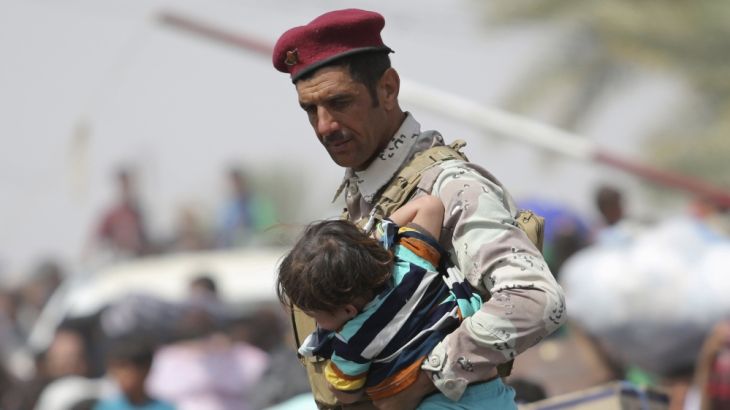Fear of a hidden ISIL
As thousands flee Anbar, security forces fear ISIL fighters will slip into Baghdad disguised as displaced people.

Baghdad – The midday heat beats down and reflects off the concrete floor. If you stand still for long enough it feels like the sun is cooking you from above while the ground is boiling you from below.
I’m at a camp in Baghdad for “internally displaced persons” or IDPs. It’s one of those official, bureaucratic terms that tries at once to be both informative and neutral and fails at both. Perhaps a more truthful term would be to describe this place as a camp for refugees within their own country, as that is what they are.
Keep reading
list of 4 itemsMoscow theatre attack suspects show signs of beating in court
Four men showing signs of severe beating charged over Moscow concert attack
Russia mourns Moscow concert hall attack victims as death toll rises to 137
They came here, carrying what little they could fleeing Anbar where the Islamic State of Iraq and the Levant (ISIL) group holds sway across much of the province.
Ali Abid saw ISIL fighters take villages near his home city of Ramadi. When they got closer they fled and came to Baghdad. After crossing a bridge he saw Iraqi forces checking ID cards and turning some away. He and his family were worried. Would they get through? Where would they go if they didn’t?
They searched our house saying they were looking for guns and bombs. They thought we were ISIL.
“When we reached the bridge there were hundreds of people waiting. On the other side security forces were checking IDs, in particular those of young men. I saw fear and suspicion in their eyes, they were aggressive and rude.”
Although Ali says the security forces didn’t mention ISIL by name, it was clear by the question being asked that’s who they were looking for.
Ali is 31 years old. That makes him suspect to many here in Baghdad. The Iraqi security forces are on high alert for members of ISIL posing as “displaced persons” and trying to infiltrate. After being forced to spend a night in the open Ali’s family got on a minibus and made for the capital.
Sectarian harassment
In Baghdad they didn’t fare much better. For the first couple of days things were good. They found a house and spent their savings furnishing it. Ali was relieved to be safe. About six months ago, he and his young wife were sitting in their garden when a mortar shell landed nearby. His wife was hurt and he narrowly escaped injury. Ali hoped that no shells would land here.
“We wanted to make this house our home. I was in Baghdad and God willing I could get some work. After a couple of days though, groups of young men would knock at the door. We are Sunnis from Ramadi and we had moved to a Shia neighbourhood. They searched our house saying they were looking for guns and bombs. They thought we were ISIL.”
|
|
Ali hoped that after a while the harassment would stop and things would calm down. It didn’t. Day or night and without warning the young men would knock at his door. Eventually the family received a note from their neighbour urging them to leave for fear of what might happen to them.
Ali left his new home after little under a week and came to this camp in Baghdad, where he now lives and where he tells me his story. His story isn’t uncommon. Neighbourhood watch groups have taken it upon themselves to investigate new arrivals like Ali, to monitor for suspicious movements.
Fear of a hidden ISIL cell has gripped the city. Young men like Ammar are trying to protect themselves. “They park cars with explosives in our streets, in our markets, they kill without discrimination. Of course I’m angry, of course we are suspicious of new people.” Ammar told me this in February before the latest wave of people arrived from Anbar.
Fear is a powerful weapon. Across social media gruesome rumours of Anbar families killing their hosts have spread. Retaliation has allegedly taken place with eight bodies of the same Anbar family being found in streets of Baghdad. Young men like Ali and Ammar are scared and want to defend themselves and their communities.
Fear of a hidden ISIL has heightened tension and Baghdad has been here before. From 2006 to 2008 sectarian violence nearly plunged Iraq into a civil war. American occupation of the country allowed a space in which al-Qaeda and Shia militias thrived, turning areas of Baghdad into no-go zones depending on whether you were Sunni or Shia.
It was fear that allowed that to happen, fear that turned into anger, anger into violence. Now, once again that fear has raised its head.